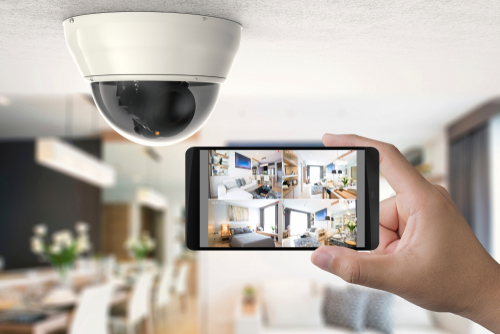Truth is, burglars can hit any neighborhood, and in fact, they often target homes where they will walk away with the most valuable possessions and the least risk. When you install a home security system, you lower the costs of home insurance by as much as 20 percent. The FBI reports that home burglaries happen every 15 seconds within the United States. That should demonstrate the importance of home security.
Why Does a Home Security System Lower Home Insurance Costs?
Whether it will lower your premiums depends on the provider, but insurance companies often choose to lower the costs because of how it adds an extra layer of security to the home and lowers the risk that they will have to pay out money.
The lower the risk, the less you pay. Along with decreasing the risk of burglary, home security systems lower the risk of vandalism. Before you buy a system, ask your insurance provider about discounts because they will even provide discounts for certain systems in some cases.
Deadbolt to Lower Insurance Costs
If you don’t have a deadbolt installed on your door, you may want to contact A1 Locksmith Philadelphia to have it installed. Depending on the policy, many insurance providers offer discounts for those who have deadbolts on their exterior door.
Even if your current insurance provider doesn’t offer this discount, you could switch to another company to have your costs lowered. To get this discount, most companies will require that you have deadbolts installed on all the exterior doors.
That’s because if you leave the back door open to getting broken into, it still leaves a liability to the insurance company. To install a deadbolt, it doesn’t cost too much. Usually, it will cost around $55 for the trip, $45 to install it and $35 for the deadbolt. In total, you can expect an average cost of between $135 to $145. The money saved over time on your premium will be worth the cost.
How to Tell if You Have a Good Home Security System?
Most alarm systems will come with an NSI certificate. NSI stands for “National Security Inspectorate,” and this demonstrates that the home security system will at least meet the requirements of the police and fire department.
Before you ever buy a home security system, you should know if your security system has this because many insurance providers will ask for it. This will determine how much you lower your insurance premiums. Surveillance cameras and alarm systems.
Different Locks Will Impact Insurance Premiums
Not only do locks keep you safe, but they can also lower your insurance premiums. First, you need to choose the right door and window locks. You have a few locks available that include:
- Bolts
- Five-lever mortice locks
- Surveillance cameras
- Multi-point locking systems
- Sash and deadlock mortices
Insurance providers usually favor the most secured locks. For that reason, they look favorably on the five-lever mortice locks because it achieves a higher standard of home security. In fact, it reaches the British Standard, which is normally BS 3621. These locks require a key for both locking and unlocking the door.
If you were to choose a multi-point locking system, that’s another choice that comes with an abundance of security. For example, the SS312 Diamond approved cylinders can be found on uPVC doors and composite doors. These doors will at a minimum have three different locking points that will all lock at the same time as the key gets turned.
What Security Failures Will Cost Me More?
You have a couple of things that can wind up costing you more for your home insurance. For example, old locks on the home can add to the cost of your premiums. In addition, previous home burglaries could raise the cost of your insurance when you filed claims. Unfortunately, it isn’t uncommon for a burglar to hit a home a few different times if they believe that they can get away with it. In addition, they will feel more familiar with the home to do the burglary.
In general, you will normally pay more on insurance for an older home because most insurance providers consider the home as less secured and more vulnerable than some of the newer homes. Finally, the location of your home can have an impact on your premium. If you have a lot of break-ins and burglaries in the area, your insurance company will raise the costs to deal with the risks.
How Much Can You Save Each Year with a Home Security System?
On average, you could save up to 10 percent on your annual premium. Not only that, but if you have ever valuables stolen from your home, you have a greater chance of catching the burglar. Homeowner’s costs on average between $300 to $1,000 per year, depending on the value of the home. Assuming you pay $600 per year, you’d save $60 each year on homeowners insurance, which would save you $300 in five years’ time.
It isn’t just the cost paid for the system and the lowered premiums that people pay. Many times, what people like the most about a home security system comes from the fact that they have peace of mind.
Granted, even if someone breaks into the home, it doesn’t always guarantee you will catch them, but it does provide evidence to the courts if one day the burglar gets caught. They could link him to this burglary based on evidence from another one, and he may have to pay restitution for the stolen value. It helps to build a case against criminals.
The Wrong Locks Will Cost You
Insurance companies will always ask what kind of locks you have on your home. The wrong types of locks will put your premiums through the roof. You could even invalidate your policy without good home insurance. The locks that don’t meet up to a security standard-for example, older locks-will cost you more on your premium at the minimum. If they determine that you had a faulty lock at the time of the burglary, the company may refuse to cover you.
Another thing that you have to understand is how business security standards for insurance will differ from residential properties. You will typically need to meet an even higher standard. A locksmith company, like the ones at A1 Locksmith Philadelphia can help you to keep your home protected from the security threats. We will look at your property and determine the measures that will keep it safe. In addition, we will look for vulnerable areas that a burglar might use to enter the property.

